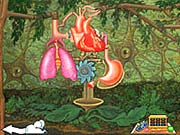 It has been four years since Northern California doctors put Ann Cowan on the kidney transplant waiting list. So far, there have been no matches. It has been four years since Northern California doctors put Ann Cowan on the kidney transplant waiting list. So far, there have been no matches.
But now she's trying a new tactic. In an ad on an Internet bulletin board called craigslist she appeals for a Good Samaritan with O-positive blood. For the 71-year-old psychotherapist, searching for a donor over the Internet is a new experience, and one she acknowledges is fraught with risk. Apparently, some people who've answered her ad are a little more daring. One respondent specifically asks, "What compensation are you willing to offer?" Although federal law prohibits the sale of human organs, there's no record of anyone ever being accused of that crime. But the Internet stirs up fears of a greedy organ underground. Twenty-five years ago, author Robin Cook wrote Coma, a novel about a black-market medical scheme where organs were auctioned to the highest bidder. It was a chilling depiction of one potential side effect of the critical donor shortage. It was only a novel, but it's rooted in some hard facts. Of 80,000 people who wait for organs every year, only 24,000 find donors, according to the California Transplant Donor Network (CTDN), which matches donor organs and recipients. And at least one of every four dies before an organ's found. The organ shortage has fueled the creation of a number of websites and message boards where patients search for donors. Surgical advances allow donors to give kidneys and liver and lung fragments. But hospitals first ask tough questions to make sure no money changes hands. Dr. Robert Osorio, director of transplant services at San Francisco's California Pacific Medical Center, says he worries that corruption might scare away altruism. "If the perception of the public is that this is going on, then I think it will decrease the amount of people out there that are willing to donate," he said. Organ websites reflect a surge in the number of Good Samaritans. Living kidney donors now outnumber donations from the dead, according to data from the Organ Procurement and Transplantation Network (OPTN). Cowan says she hopes one of those donors will answer her Internet ad. Note:
Good Samaritan: someone who gives help to people in trouble or need, without thinking of themselves.
The Samaritans is an organization helping people who are experiencing great suffering of mind and have no one to share their feelings with. (Agencies) | 早在四年前,南加州的医生就安排安·科文等候进行肾脏移植手术了,然而直到现在她还没找到相匹配的肾源。 如今她正在尝试一种新的方式:在craiglist网站公告板上登广告,用这种方法寻找O+血型的好心人为她捐献肾脏。 对于这位71岁的心理治疗学家来说,借助互联网寻找捐赠者还是头一遭,而且她认为这种做法也风险重重。 不过显然回复她的一些人更加大胆。甚至有一个人专门问道:"你愿意拿什么作为回报呢?" 尽管联邦法律禁止买卖人体器官,但是目前还没有人被控此项罪名。然而互联网的广泛应用激起了人们对贪婪的网上人体器官秘密交易的强烈恐惧。 二十五年前作家罗宾·库克 (Robin Cook)写了一本小说《昏迷》 (Coma),讲述了一个黑市医疗阴谋,在这个黑市中人体器官待价而沽,被拍卖给出价最高的人。书中描述的由于捐献器官紧缺引起的潜在恶果着实让人不寒而栗。虽然那只是一部小说,但却有着深刻的现实根源。 根据负责匹配捐献器官和接受者的加利福尼亚移植捐赠网络(CTDN)资料,每年有8万人等待接受器官捐献,却只有2.4万人能够找到捐献者。至少四分之一的患者因没有找到匹配的器官而死亡。 由于器官缺乏,一些为患者寻找捐赠者的网站和留言板应运而生。 外科手术的进步使捐赠者能够提供肾脏、肝脏以及部分肺片。但是医院首先要提出一些苛刻的问题以确保过程中间没有器官转卖交易。旧金山加利福尼亚太平洋医疗中心的移植服务主任罗伯特·奥索里奥说他担心腐败会"吓跑"那些无私的人。 罗伯特说:"如果公众认为这种(器官转卖)现象存在,那么愿意捐献器官的人就会减少。" 器官网站上涌现出许多乐善好施的人。器官供应移植网络(OPTN)数据显示,现在捐献肾脏的活人比死人数量多。科文希望有捐献者能够回复她的网络广告。 (中国日报网站译) |
